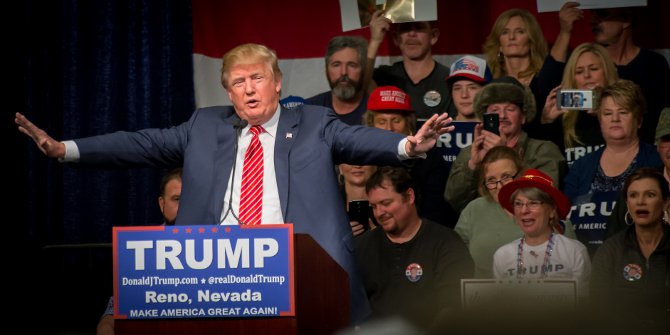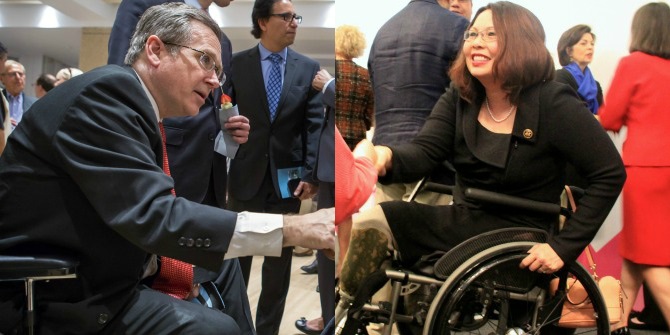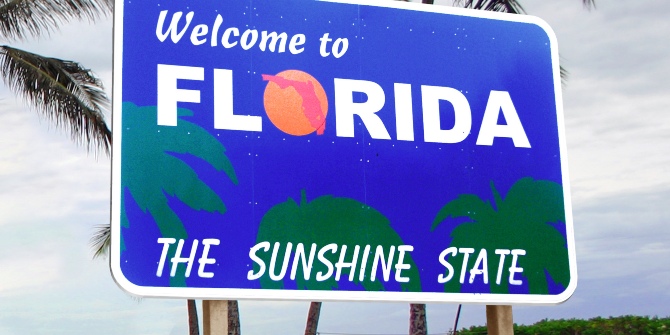 The meteoric rise of New York billionaire Donald Trump to the top of the Republican Party’s presidential primary field despite calling for bans on Muslims entering the US has prompted many commentators to suggest that his brand of politics are ‘un-American’. Peter Harris writes that while Trump’s politics are almost certainly illiberal, they actually fit relatively well with American society’s historic tendency to limit democracy and opportunity to certain groups because of their race, sex, religion or class.
The meteoric rise of New York billionaire Donald Trump to the top of the Republican Party’s presidential primary field despite calling for bans on Muslims entering the US has prompted many commentators to suggest that his brand of politics are ‘un-American’. Peter Harris writes that while Trump’s politics are almost certainly illiberal, they actually fit relatively well with American society’s historic tendency to limit democracy and opportunity to certain groups because of their race, sex, religion or class.
Is Donald Trump’s brand of politics un-American? The answer, of course, depends upon what it means to be “American.” For those who see America’s greatest traditions as basically synonymous with liberalism, then the answer is clearly yes: there is nothing liberal about religious tests on immigration, censorship of the Internet, or issuing death threats to the families of suspected terrorists.
For those who adopt a more realistic view of American political development, however, the uncomfortable truth is that Trump does represent some longstanding and deep-rooted strands of national political philosophy. Critics of the pugilistic billionaire have been slow to grasp this fact; even though Trump’s quintessential Americanness is entirely obvious to his supporters.
The argument that the United States is a fundamentally liberal polity was famously advanced in the 1950s by Louis Hartz. In The Liberal Tradition in America, Hartz wrote that America was uniquely fortunate for having been spared any real historical experience with feudalism or despotism. The country had been “born free,” and Lockean liberalism was all that its people knew.
But any serious student of US history knows that the Hartzian narrative is not much better than Whiggish whitewash. For while it might be appealing to believe that the United States has always been an Algeristic land of opportunity defined solely by its adherence to the tenets of classical liberalism, the truth is far messier—and far murkier.
Nearly twenty years ago, the political scientist Rogers Smith advanced what he called the “multiple traditions thesis” of American political culture. Although Smith did not deny the importance of liberalism to the American experience, he rejected the notion that the US had been shaped by it alone.
Instead, according to Smith, American political philosophy—both historical and contemporary—can be said to comprise three distinctive strands: liberalism, to be sure, but also republicanism and a robust belief in what Smith called “ascriptive hierarchies” (in lay terms: sexism, racism, sectarianism, and other forms of bigotry).
What is more, liberalism has never been a truly universal creed in America. Instead, the fruits of enlightened liberalism have only been enjoyed by some groups of people and at some times. The rule of law, the protection of the constitution, the right to own property, basic political and civil liberties—these things have historically been unevenly distributed in the American polity, with some groups—women, non-whites, non-Protestants, newcomers—often being excluded from participating in the business of liberal self-government.
Partly, such limitations on liberalism’s reach have been the product of American republicanism, Smith argued. A republic, of course, is a political system in which “the people” exercise self-rule. But in America, there has always been some disagreement over just how “the people” should be defined. The simple fact of residence within the geographic scope of the United States has not always been enough to guarantee access to the republic’s political institutions.

At first, the circle of participants in American democracy was limited to just a select group of property-owning Anglo-Saxon men. Gradually, the franchise expanded to include more and more groups of people—poorer whites, women, people of color, and so forth. But membership of the political community has never been natural, obvious or uncontroversial; throughout US history, some people have been organized “in” to the republic’s political fabric and others organized “out.”
And here Smith’s third strand of American political culture warrants emphasis: because of the prevalence of ascriptive hierarchies, the US has never been a truly egalitarian society and instead always has been defined by strict social stratification, with hereditary characteristics—race, sex, religion, class at birth—being particularly important organizing principles.
What the multiple tradition thesis helps to bring into focus is that American history has not proceeded—and is not currently proceeding—according to some sort of righteous pre-destined pathway. Liberalism exists in America but, to borrow from a recent headline, “there is nothing inevitable” about it.
Liberalism’s influence on American politics has waxed and waned over time, just as republican expressions of nativism, xenophobia and isolationism can undergo fluctuations, and just as beliefs in ascriptive hierarchy can become more or less salient depending upon the historical context.
The Trump phenomenon should be seen in this light: Trump is not a classical liberal—that much is beyond debate—but his appeals to American nationalism and nativism make him a pronounced (small ‘r’) republican, and his anti-Muslim and anti-immigrant rhetoric undoubtedly taps into a wellspring of common beliefs in ascriptive hierarchy.
In other words, Trump’s political platform is very American even if it is very illiberal—a description that also befits his followers. Indeed, the same might be said of others in the Republican field right now. After all, Ted Cruz, Ben Carson, Mike Huckabee and Rick Santorum also have been known to spout views that strike many as noisily illiberal, but are able to amass widespread appeal because they tap into those non-liberal strands of American political thought—namely, insular republicanism and unashamed inegalitarianism.
The popularity of illiberal politics in this election cycle should put paid to any lazy assumptions that either US politics or society are headed in a linear, teleological direction. Despite the best wishes of some—the current occupant of the White House included, perhaps—the country is not destined to become a liberal utopia.
To be sure, political actors inside the US have made great strides made towards civil rights and equality in recent decades—for people of color, women and members of the LGBT community in particular—but such gains are not universally accepted, and they are not irreversible.
And this is why it is important to understand the origins of Trump’s appeal: because his supporters are ordinary Americans who adhere to some traditional (even if ugly) American values, and who are not about to disappear anytime soon; any political strategy to deal with and defeat Donald Trump must also deal with the aspirations of those who would lend him their vote.
Optimists might hope that Trump’s demise will come about when his supporters are reminded of the merits of tolerant liberalism, the best of America’s political traditions. But that would be wishful thinking. The truth is that depriving Trump of his political support will not be easy, and it will not be pretty.
Please read our comments policy before commenting.
Note: This article gives the views of the author, and not the position of USApp– American Politics and Policy, nor of the London School of Economics.
Shortened URL for this post: http://bit.ly/1N32QZZ
_________________________________________
 Peter Harris – Colorado State University
Peter Harris – Colorado State University
Peter Harris is an assistant professor of political science at Colorado State University, where he teaches classes on international security, US foreign policy and International Relations theory. He received his Ph.D. in Government from the University of Texas at Austin, where he was also a graduate fellow of the Clements Center for History, Strategy and Statecraft.







We Americans are generous, tolerant, and cautious… Trump is none of those things, he is from Mars.